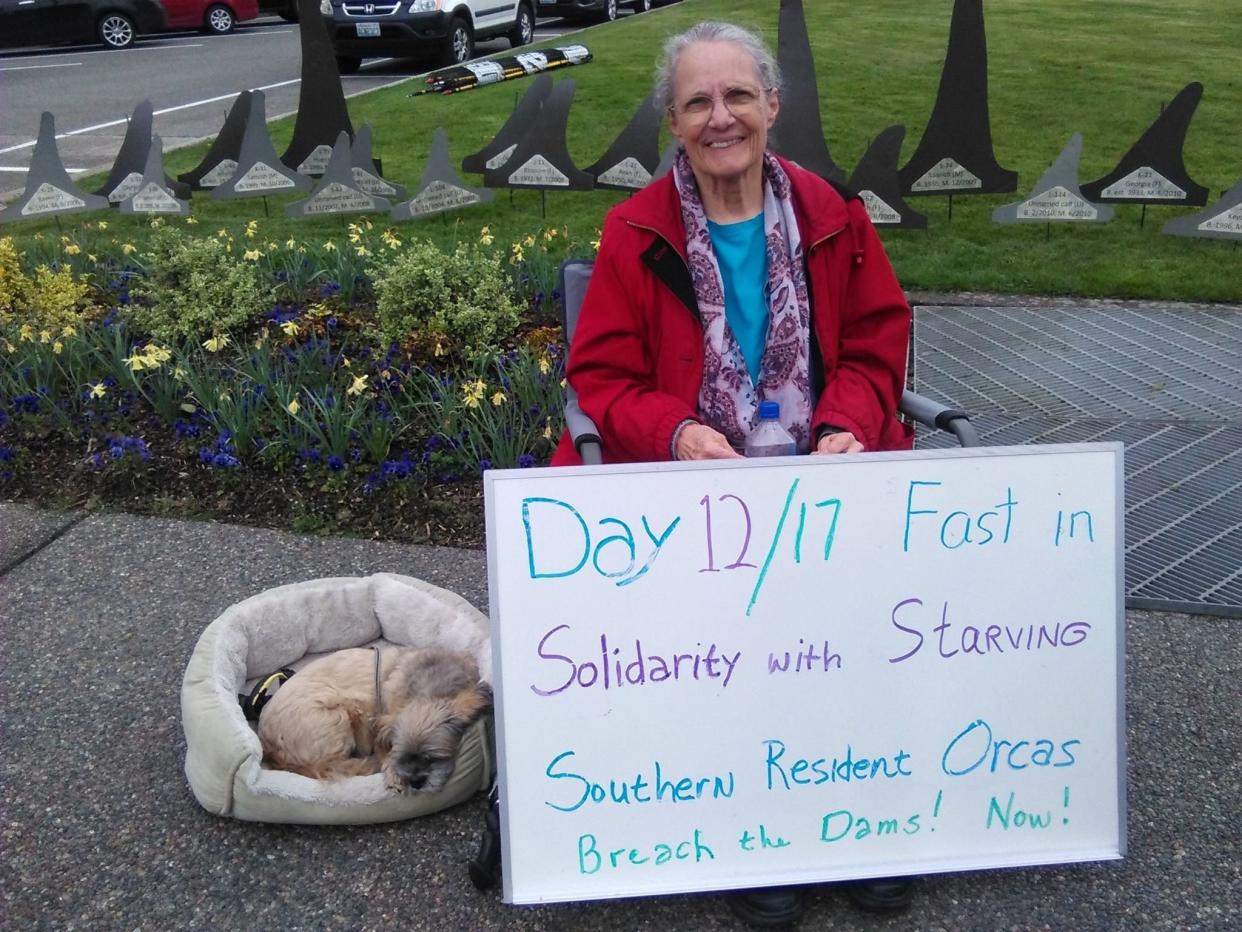71-year-old woman completes 17-day hunger strike for starving orcas

The sight of a black and white killer whale emerging from the depths of the Pacific Ocean used to be an iconic sight in Washington state— but not anymore.
That’s why a 71-year-old Washington woman went on a 17-day hunger strike to raise awareness about the starving orcas. From April 1 to April 17, Lanni Johnson fasted in solidarity with the orcas at the Washington State Capitol in Olympia alongside a fellow advocate in an orca suit.
“Killer whales are the apex predator of the ocean. They are to be cared for and respected—not to be starved,” Johnson tells Yahoo Lifestyle. “They’re starving to death and we need to get food to them. It was the only way that I could think of to get people’s attention.”
And that’s exactly what she did. Johnson’s documented her strike on social media and garnered the attention of local news outlets and the internet alike as she camped in the lobby of the state legislature building or outside of it.
With a sign that read, “Fast in solidarity with the starving Southern Resident Orcas” Johnson also kept an updating counter indicating the number of days she had been on strike. She says people would “give me a thumbs up, smile, or ask me questions.” One Seattle woman saw a local news segment on Johnson and drove all the way to talk with the orca activist.
While Johnson believes she successfully achieved her goal, the act of solidarity was no easy feat. “I was so weak I couldn’t carry my own things or walk very far. I was short of breath. I couldn’t function without help,” Johnson tells Yahoo Lifestyle. The 71-year-old consumed nothing but water and pink Himalayan salt for 17 days— the same number of days a local orca named Tahlequah carried her dead calf last summer, which was the moment that sparked her activism. “The last Monday and Tuesday were incredibly difficult. My body was yelling at me to eat. That was hard— But I didn’t. The deadline was on Wednesday and I just wanted to finish.”
Johnson wasn’t always a die-hard orca activist. It was only after watching the 2013 documentary Blackfish that she was turned on to the “plight of the orca population in Puget Sound.”
“I realized what a treasure they are and that they should be protected. I didn’t realize how endangered they were,” says Johnson, who said news about Tahlequah alerted her to the “direness” of the situation. “I assumed they were being taken care of and that people were doing what they need to do to fix this.”
The population of orcas in Washington has been plummeting in recent years. The annual census of Puget Sound's resident orcas found only 75 killer whales, a precipitous 30-year low. Experts say orcas are “essentially starving” due to a decline in the chinook salmon population, their primary food source, and are on the verge of extinction. According to Johnson, the solution to the declining salmon and orca populations rests on breaching four dams on the Lower Snake River that are blocking salmon from accessing “the finest fertilizing streams.”
“Since the salmon is the touchstone of the ecology of the entire northwest, if we’re ready to let them and we’re ready to let the killer whales go to support the economy of those in the area, that would have to be our choice,” says Johnson. “I just want people to know that that is the choice that they are making.”
While Wash. state representatives say the dams are necessary for farmers, energy and jobs, Johnson says the arguments are founded on misconceptions and that the economic costs of breaching the dams could easily be mitigated. “There is very little argument for keeping the dams beyond the economies in that area will be impacted. Once the chinook are able to return and spawn, it will be fruitful,” says Johnson adding that breaching the dams could attract other economic outputs such as salmon, rafting and more.
While the state has Washington Gov. Jay Inslee assigned an orca recovery task force and agenda, Johnson felt that the state’s efforts were not enough.“Their solutions are years down the road. The southern residents may not be there then,” says Johnson. “Scientists say they’re balancing on a pin head towards extinction.”
Johnson hopes that her hunger strike will serve as a call to action to residents of Washington to urge the state to get rid of the dams and do more to care about the southern resident orcas. “This is where we are. If you want to save it, you have to do something. You have to let politicians and decision makers know.”
Read more from Yahoo Lifestyle:
? Police officer responds to 5-year-old's emergency 911 call: 'Can you bring me McDonald's?'
Follow us on Instagram, Facebook, and Twitter for nonstop inspiration delivered fresh to your feed, every day.
